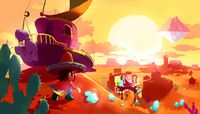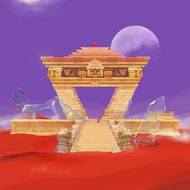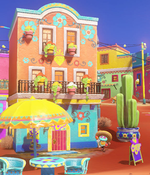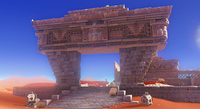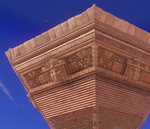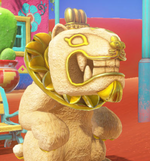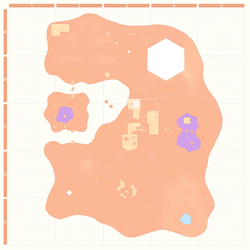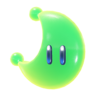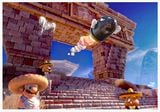Sand Kingdom
- Not to be confused with Desert Kingdom.
Template:SMOlocation-infobox The Sand Kingdom is the third kingdom visited in Super Mario Odyssey. It is the greater location of Tostarena, which is a desert village featuring a small town and a large ruins area. This kingdom's main landmark is the Inverted Pyramid, which is an upside-down pyramid located in the north-east section of the area. When Mario first visits here, the kingdom is covered with large pillars of ice and Bowser is found atop the Inverted Pyramid. The player's first objective in this kingdom is to reach the "highest tower". From there, the player must find Moon Shards in the sand. After that, they reach the top of the Inverted Pyramid and fight Hariet, one of the Broodals, which will grant the player a Multi Moon. When collected, the player is teleported back to the Odyssey, and the kingdom cycles to a night-time version, where the Inverted Pyramid floats into the air, revealing a large hole underneath. The kingdom is also overrun by Chinchos during the night-time, which Mario must avoid as he heads to the large hole under the Inverted Pyramid. Once the player enters, he must traverse through an icy Underground Temple and then fight Knucklotec at the end of the Temple. Defeating this boss rewards Mario with another Multi Moon, which (when collected) reverts the kingdom back to daytime and causes almost all the ice on the surface of the kingdom to melt, allowing access to more Power Moons. Once Mario has collected enough Power Moons, he can head off to the next kingdom - either the Lake Kingdom or the Wooded Kingdom may be chosen, but not both at this point.
The Sand Kingdom was the first location shown in the game, dating back to the first Nintendo Switch reveal trailer. It is located east of the Cascade Kingdom, southwest of the Lake Kingdom, and northwest of the Wooded Kingdom.
The location is primarily based off of Mesoamerica, particularly Mexico. However, other aspects allude to different countries, with Moe-Eyes inspired by the moai statues from Easter Island and the Jaxis presumably inspired by the komainu from Japan.
Concept and creation
Tostarena was based on Mexico because the director of Super Mario Odyssey, Kenta Motokura, liked the country and his trip there had left a strong impression on him.[1] Initially, it was considered whether Tostarena should be visited during the sunset.[2] The sketch of the early design showed that the poncho and sombrero were already considered as the location's typical outfits, even though the motif of the sombrero was different and the poncho was supposed to be worn over Mario's usual suit and to be paired with boots. The concept art already included Tostarena Town, Tostarena Ruins and the Inverted Pyramid, as well as the ice pillars covering parts of the desert. The main visible differences are the town having just two rows of buildings forming one street while featuring a wooden gate at the entrance and the Inverted Pyramid being actually a floating pyramid resembling that of Chichen Itza. Some elements introduced in Tostarena, namely the Sphynx and the Moe-Eyes, were reportedly a reference to Super Mario Land, another game that features Sphinxes and Moai-like beings in a part-desert kingdom.[3]
Tostarena Town in particular was designed to create a contrast between the curved lines of the dunes and the more linear design of the buildings.[4] Furthermore, the color of the building was chosen to reflect the cheerful nature of the Tostarenans.[4] The concept art also shows that initially the town was supposed to have a bridge built over a road.
On the other hand, the gate to Tostarena Ruins was designed to resemble an inverted triangle as a recall to the Inverted Pyramid.[5] The concept artwork showed how the Power Moons of Tostarena were initially intended to be red instead of the final green color.
Brochure details
Tostarenan Town
A small town that serves as the hub for tourists planning to visit the Inverted Pyramid. The colorful buildings and cheerful people provide a warm welcome for visitors. They're happy to provide direction, so don't hesitate to say hello.
Mysterious Ancient Ruins
Head north from town and you'll be greeted by ancient ruins that dot the expansive desert. Though many have become conflict regions patrolled by Bullet Bills, their status as important heritage sites is undeniable.
Your eye by be drawn to the large stone tower at the heart of the ruins. Due to extensive hollowing underground, quicksand has become prevalent in this area, so watch out.
Inverted Pyramid
The true "can't miss" of this region, the Inverted Pyramid may look unstable, but rest assured it never topples and has thrilled tourists for years. It is said that a legendary artifact called the Binding Band lies within, and the upside-down pyramid symbolizes how those joined by it will never part even if the world turns upside down.
Jaxi
Let's have a look at the curious local transport method known as the Jaxi.
Just hop on the back of one, and as you might guess from their appearance, you'll be in for a wild but completely reliable ride.
Make good use of them and you'll be exploring this unforgiving desert in comfort and style.
Living Heart of the Desert
Here's a spot to moisten your dried and withered heart, with greenery and water to make you forget you're in the desert. The fish and birds are plentiful and well worth a visit.
The Moe-Eyes love their shades.
They'll run if chased, but they're a proud people who have long inhabited these ruins. Please be polite.
Three Keys to the Kingdom
- Enjoy the small but lively desert village and its charming inhabitants.
- Wonder at the Inverted Pyramid and its upside-down magic.
- Watch for the gem iconography carved in relief on the ruins.
Map
- Tostarena Town
- Tostarena Ruins Entrance
- Tostarena Ruins Sand Pillar
- Tostarena Ruins Round Tower
- Moe-Eye Habitat
- Jaxi Ruins
- Tostarena Northwest Reaches
- Desert Oasis
- Southwestern Floating Island
- The Inverted Pyramid
Enemies
- Bullit bill smb 1.PNG
8-bit Bullet Bills
- Knucklotec Artwork SMO.jpg
Knucklotec (boss)
Objectives
- Atop the Highest Tower: The goal is to reach the top of the tower in the Tostarena Ruins.
- Moon Shards in the Sand: The goal is to collect the Moon Shards on the west side of the kingdom.
- Showdown on the Inverted Pyramid: The goal is to reach the top of the Inverted Pyramid and defeat Hariet.
- The Hole in the Desert: This objective takes place at night. The goal is to enter the hole beneath the Inverted Pyramid and defeat Knucklotec.
Power Moons
- Main article: List of Power Moons in the Sand Kingdom
There are a total of 89 Power Moons in the Sand Kingdom. During the player's first visit to this kingdom, they can collect 61 of the Power Moons. The player can also collect a Power Moon if they travel to this kingdom using a painting found in a future kingdom (either the Lake or Wooded Kingdom). One additional Power Moon can also be found when the player encounters the Tostarenan tourist in the kingdom (after he has visited all other locations). After the player defeats Bowser in the Moon Kingdom, 6 more Power Moons become available to collect. The Moon Rock will also be available to destroy, causing 20 additional Power Moons to be accessible.
In order to progress to the next kingdom, the player must collect at least 16 Power Moons.
Regional coins
- Main article: List of regional coins in the Sand Kingdom
The Sand Kingdom contains 100 regional coins, which take the form of inverted pyramids (based on the large Inverted Pyramid found in this kingdom).
Gallery
The Odyssey landing in the Sand Kingdom.
- SMO-E32017-scrn02.jpg
Mario and Cappy.
Tostarena Town's Crazy Cap shop.
Mario passing by a Tostarenan.
- SMO-E32017-scrn06.jpg
Mario playing a guitar.
- SMO-E32017-scrn01.jpg
Mario capturing a Goomba.
- SMO-E32017-scrn07.jpg
2D section in Tostarena Ruins.
- SMO-E32017-scrn13.jpg
Bowser's airship above the Inverted Pyramid.
The Broodals in their airship.
- Jaxi SMO.jpg
Mario riding a Jaxi through the desert.
- SMO-ND0913-SCRN12.jpg
Mario riding a Jaxi through the desert.
Knucklotec attacking Mario.
Names in other languages
Sand Kingdom
| Language | Name | Meaning | Notes |
|---|---|---|---|
| Japanese | 砂の国[?] Suna no kuni |
Sand Country | |
| Chinese | 沙之国 (Simplified) 沙之國 (Traditional)[?] Shā zhī guó |
Sand Country | |
| Dutch | Woestijnrijk[?] | Desert Realm | |
| German | Wüstenland[?] | Desert Country | |
| Italian | Regno delle Sabbie[?] | Sands Kingdom | |
| Korean | 모래 왕국[?] Morae Wangguk |
Sand Kingdom | |
| Russian | Песчаное царство[?] Peschanoye tsarstvo |
Sand Kingdom | |
| Spanish | Reino de las Arenas[?] | Sands Kingdom |
Tostarena
| Language | Name | Meaning | Notes |
|---|---|---|---|
| Japanese | アッチーニャ[6] Acchīnya |
From acchicchi, an expression for "hot" and burning. | |
| Chinese | 阿炽尼亚 (Simplified) 阿熾尼亞 (Traditional)[?] Āchìníyǎ |
Transliteration of the Japanese name | |
| Dutch | Zonnesteekstad[?] | Sunstroke City | |
| German | Brutzelebene[?] | Sizzle Plain | |
| Italian | Tostalandia[?] | From Tostarena and the suffix -landia (land) | |
| Korean | 아뜨레나[?] Atteurena |
? | |
| Russian | Тостарена[?] Tostarena |
Tostarena | |
| Spanish | Soltitlán[?] | From Spanish sol (Sun) and Nahuatl titlán (place), which is commonly found in town names in Mexico. |
References
- ^ Brian (November 25, 2017). Super Mario Odyssey producer on approach to development, theme song, Pauline, higher age rating, more. Nintendo Everything. retrieved January 11, 2018.
- ^ Post about the concept art of Tostarena's early design from the Japanese Super Mario Odyssey official Twitter account. Retrieved January 11, 2018.
- ^ Game Informer Staff. (June 17, 2017). Mario's Developers On Hat Capture And Peach's Love For Mario. Game Informer. Retrieved January 11, 2018.
- ^ a b Post about the concept art of Tostarena Town's early design from the Japanese Super Mario Odyssey official Twitter account. Retrieved January 19, 2018.
- ^ Post about the concept art of the gate to Tostarena Ruins from the Japanese Super Mario Odyssey official Twitter account. Retrieved February 7, 2018.
- ^ Official Japanese Mario Odyssey Twitter
